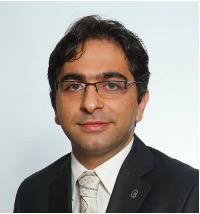IEEE Circuit and System (CAS) Seasonal School on In-Memory Computing (IMC 2024) – First Phase
The main goal of this seasonal school is to dive deep into the rapidly developing field of in-memory computing with a focus on Artificial intelligence (AI) and cover its cross-layer design challenges from device to algorithms. The IEEE Seasonal School in Circuits and Systems on In-Memory Computing (IMC 2024) offers talks and tutorials by leading researchers from multiple disciplines and prominent universities and promotes student short presentations to demonstrate new research and results, discuss the potential and challenges of the in-memory accelerators, future research needs, and directions, and shape collaborations.
First Talk Title: Developing True Intelligent System: Tools and Case Studies
In recent years, we have seen tremendous growth in the AI/ML domain. However, we are still far away from building truly intelligent automated systems. To achieve a true intelligent agent, one should better human decisions and should learn continuously with minimal human intervention. In this talk, we talk about Reinforcement Learning (RL), one key tool to achieving this intelligence. We will discuss the recipe for leveraging RL to create true intelligent systems. As a proof of concept, we discuss two research directions on leveraging RL tools to create intelligent automated agents. Finally, we touch upon some open questions that need to be addressed to realize the dream of true intelligent systems.
Second Talk Title: General-Purpose Processing in Memristive Memory Arrays
In the last decade, computing systems have faced several challenges that have slowed down their performance improvement substantially. Moreover, we are facing serious challenges and concerns regarding the energy consumption of computing systems. To contain this increasing gap between performance demand and supply alternative paradigms and technologies have been heavily researched. One of the outstanding alternatives is Memory-Centric Computing (MCC). The main idea of MCC is to process data as close as possible to the memory. This reduces the delay and energy overhead associated with loading data for processing and sending it back to the memory for storing the results. MCC can be performed using any memory technology. Among various memory technologies, memristors stand out as one of the best candidates. They are non-volatile, fast, extremely compact, and compatible with the widely used Complementary Metal-Oxide Semiconductor (CMOS) technology. These properties give them an edge in terms of energy efficiency, speed-up gains, price, and their potential share in the future market, respectively. In this talk, we focus on computation inside the memory array and using stateful logics. Processing data inside the array leads to the minimum data travel distance possible, which maximized the associated benefits. We present an overview of some the computational units that we have proposed, such as adders, multipliers, sorting systems, and filters, some of which are combine MCC with other emerging computing paradigms such as stochastic and approximate computing.
Date and Time
Location
Hosts
Registration
-
 Add Event to Calendar
Add Event to Calendar
- 154 Summit Street, Newark, NJ 07102
- NJIT
- Newark, New Jersey
- United States 07102
- Building: ECEC Building
- Room Number: ECEC 100
- Click here for Map
- Contact Event Hosts
-
Dr. Ajay K. Poddar, Email:akpoddar@ieee.org
Dr. Edip Niver, email: edip.niver@njit.edu
Dr. Durga Misra, Email: dmisra@ieee.org
Dr. Anisha M. Apte, Email: anisha_apte@ieee.org
- Co-sponsored by IEEE North Jersey Section
Speakers
Dr. Arnob Ghosh of NJIT
Developing True Intelligent System: Tools and Case Studies
In recent years, we have seen tremendous growth in the AI/ML domain. However, we are still far away from building truly intelligent automated systems. To achieve a true intelligent agent, one should better human decisions and should learn continuously with minimal human intervention. In this talk, we talk about Reinforcement Learning (RL), one key tool to achieving this intelligence. We will discuss the recipe for leveraging RL to create true intelligent systems. As a proof of concept, we discuss two research directions on leveraging RL tools to create intelligent automated agents. Finally, we touch upon some open questions that need to be addressed to realize the dream of true intelligent systems.
Biography:
: Arnob Ghosh has been an Assistant Professor at the Department of Electrical and Computer Engineering at New Jersey Institute of Technology since September 2023. Before that Arnob Ghosh was a Research Scientist at the Dept. of Electrical and Computer Engg. at the Ohio State University with Ness Shroff. Arnob Ghosh obtained his Ph.D. degree from the University of Pennsylvania, USA in Electrical and Systems Engg. Prior to joining the OSU, he was an Assistant Professor at the IIT-Delhi. Arnob Ghosh has worked in diverse areas with the theme of efficient decision-making in interconnected systems. His current research interests include Reinforcement Learning, game theory, Online Learning, and decision theory, and applying those tools in various engineering applications. He has published in several top-tier journals and conferences (including top ML conferences such as NeurIPS, AISTATS, and ICLR). His paper was the runner-up in the best paper category at IEEE WiOpt'22.
Email:
Address:Newark, United States
Dr. Nima Taherinejad of Heidelberg University, Germany
General-Purpose Processing in Memristive Memory Arrays
In the last decade, computing systems have faced several challenges that have slowed down their performance improvement substantially. Moreover, we are facing serious challenges and concerns regarding the energy consumption of computing systems. To contain this increasing gap between performance demand and supply alternative paradigms and technologies have been heavily researched. One of the outstanding alternatives is Memory-Centric Computing (MCC). The main idea of MCC is to process data as close as possible to the memory. This reduces the delay and energy overhead associated with loading data for processing and sending it back to the memory for storing the results. MCC can be performed using any memory technology. Among various memory technologies, memristors stand out as one of the best candidates. They are non-volatile, fast, extremely compact, and compatible with the widely used Complementary Metal-Oxide Semiconductor (CMOS) technology. These properties give them an edge in terms of energy efficiency, speed-up gains, price, and their potential share in the future market, respectively. In this talk, we focus on computation inside the memory array and using stateful logics. Processing data inside the array leads to the minimum data travel distance possible, which maximized the associated benefits. We present an overview of some the computational units that we have proposed, such as adders, multipliers, sorting systems, and filters, some of which are combine MCC with other emerging computing paradigms such as stochastic and approximate computing.
Biography:

His areas of work include computer architecture (especially memory-centric and approximate computing), cyber-physical and embedded systems, systems on chip, memristor-based circuit and systems, self-* systems, and smart health-care. He has published three books, five patents, and more than 100 articles. Prof. Taherinejad has served as an editor of many journals, an organizer and a chair of various conferences and workshops. He has received several awards and scholarships from universities, conferences, and competitions he has attended. This includes the Best University Booth award at DATE 2021, First prize in the 15th Digilent Design Contest (2019) and in the Open-Source Hardware Competition at Eurolab4HPC (2019) as well as Best Teacher and Best Course awards at TU Wien (2020).
Address:Heidelberg University, Germany, , Heidelberg, Germany
Agenda
Event Time: 11:00 AM to 1:30 PM
11:00-11:25 AM Registration and Networking
11:25-11:30 AM Opening Remarks by Dr. Shaahin Angizi, Vice-Chair, IEEE CAS/ED Chapter
11:30 AM - 12:00 PM Talk I: Dr. Arnob Ghosh (New Jersey Institute of Technology)
Title: Developing True Intelligent System: Tools and Case Studies
12:00-12:45 PM Talk II: Dr. Nima Taherinejad (Heidelberg University, Germany)
Title: General-Purpose Processing in Memristive Memory Arrays
12:45 PM - 1:00 PM Networking and Discussion
1:00 PM - 1:30 PM Lunch & Concluding Remarks by Dr. Shaahin Angizi, Vice-Chair, IEEE CAS/ED Chapter
Location: CKB 402, New Jersey Institute of Technology, Newark, NJ, USA
Online on Zoom, Link: https://njit-edu.zoom.us/j/99695576739
All Welcome: There is no fee/charge for attending IEEE technical seminar. You don't have to be an IEEE Member to attend. Refreshments are free for all attendees. Please invite your friends and colleagues to take advantage of this Invited Distinguished Lecture.


